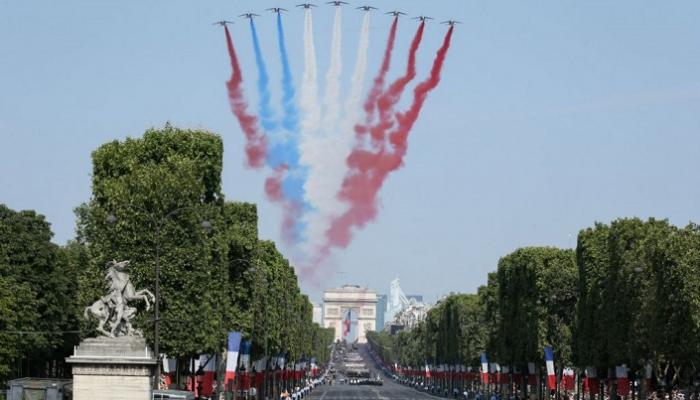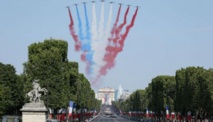"It's a great honour for me," 19-year-old Lennart Wandsleb from Dresden in eastern Germany told dpa during rehearsals earlier in the week.
He has been in France since September, working on youth activities and European mobility in the Paris suburb of Les Pavillons sous Bois.
Neele Duna, 18, from Bonn in western Germany, is also among the young volunteers picked out to take part in the display.
Her keen interest in environmental issues, which she promotes in an municipal sports and activities centre in central Paris, may be one reason she was chosen, she says.
But, she adds, it may be "also because I'm German, and I can represent Franco-German friendship."
The massive military parade of Bastille Day is "very different from the German mentality," where displays of armed might are not favoured, Neele admits.
But that is, she says, only one more reason why it's a valuable experience and a chance to discuss cultural differences with the other young people from France, Romania, Spain and Sudan who have rehearsed their part in the parade for four days in a row.
For Mohamed Omer Osman, meanwhile, it's an "incredible" opportunity.
The 22-year-old from Sudan arrived in France three years ago, and was granted political asylum in December.
Taking part in the Service Civique programme has been a way for him to integrate into French society, but also to develop skills and think about his future career, he says.
Like Lennart, he says he's "extremely happy and honoured" to have a part to play in the Bastille Day parade.
Lennart, meanwhile, is hoping that his family at home in Dresden will be able to find an online stream of the parade and see him help unfurl the tricolour on Place de la Concorde.
"They'll watch it - I think they're proud of me," he says.
-----------------------------------------------------------------------------------
He has been in France since September, working on youth activities and European mobility in the Paris suburb of Les Pavillons sous Bois.
Neele Duna, 18, from Bonn in western Germany, is also among the young volunteers picked out to take part in the display.
Her keen interest in environmental issues, which she promotes in an municipal sports and activities centre in central Paris, may be one reason she was chosen, she says.
But, she adds, it may be "also because I'm German, and I can represent Franco-German friendship."
The massive military parade of Bastille Day is "very different from the German mentality," where displays of armed might are not favoured, Neele admits.
But that is, she says, only one more reason why it's a valuable experience and a chance to discuss cultural differences with the other young people from France, Romania, Spain and Sudan who have rehearsed their part in the parade for four days in a row.
For Mohamed Omer Osman, meanwhile, it's an "incredible" opportunity.
The 22-year-old from Sudan arrived in France three years ago, and was granted political asylum in December.
Taking part in the Service Civique programme has been a way for him to integrate into French society, but also to develop skills and think about his future career, he says.
Like Lennart, he says he's "extremely happy and honoured" to have a part to play in the Bastille Day parade.
Lennart, meanwhile, is hoping that his family at home in Dresden will be able to find an online stream of the parade and see him help unfurl the tricolour on Place de la Concorde.
"They'll watch it - I think they're proud of me," he says.
-----------------------------------------------------------------------------------









 Home
Home Politics
Politics











